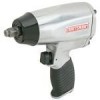Craftsman CRAFTSMAN Owners Manual - Page 6
Important Rules for Battery, Tools, Important Safety Instructions, For Charger
 |
UPC - 722470174400
View all Craftsman CRAFTSMAN manuals
Add to My Manuals
Save this manual to your list of manuals |
Page 6 highlights
Important Rules for Battery Tools I Battery tools do not have to be plugged into an electrical outlet; therefore, they are always in operating condition. Be aware of possible hazards when not using your battery tool or when changing accessories. Following this rule will reduce the risk of electric shock, fire, or serious personal injury. I Do not place battery tools or their batteries near fire or heat. They may explode. Following this rule will reduce the risk of electric shock, fire, or serious personal injury. I Do not charge battery tool in a damp or wet location. Following this rule will reduce the risk of electric shock, fire, or serious personal injury. I Your battery tool should be charged in a location where the temperature is more than 50°F but less than 100°F. Following this rule will reduce the risk of electric shock, fire, or serious personal injury. I Under extreme usage or temperature conditions, battery leakage may occur. If liquid comes in contact with your skin, wash immediately with soap and water, then neutralize with lemon juice or vinegar, If liquid gets into your eyes, flush them with clean water for at least 10 minutes, then seek immediate medical attention. Following this rule will reduce the risk of serious personal injury. Important Safety Instructions For Charger I Save these instructions. This manual contains important safety and operating Instructions for battery charger part number 9-11040 (981399-001). Following this rule will reduce the risk of electric shock, fire, or serious personal injury. I Before using battery charger, read all instructions and cautionary markings in this manual, on battery charger, and product using battery charger. Following this rule will reduce the risk of electric shock, fire, or serious personal injury. I To reduce risk of injury, charge only nickel-cadmium and nickel metal hydride type recharge able batteries. Other types of batteries may burst causing personal injury and damage. Following this rule will reduce the risk of electric shock, fire, or serious personal injury. I Do not expose charger to rain or snow. Following this rule will reduce the risk of electric shock, fire, or serious personal injury. I Use of an attachment not recommended or sold by the battery charger manufacturer may result in a risk of fire, electric shock, or injury to persons. Following this rule will reduce the risk of electric shock, fire, or serious personal injury. I To reduce risk of damage to charger body and cord, pull by charger plug rather than cord when disconnecting charger. Following this rule will reduce the risk of electric shock, fire, or serious personal injury. I Make sure cord is located so that it will not be stepped on, tripped over, or otherwise subjected to damage or stress. Following this rule will reduce the risk of serious personal injury. I An extension cord should not be used unless absolutely necessary. Use of improper extension cord could result in a risk of fire and electric shock. If extension cord must be used, make sure: 6















